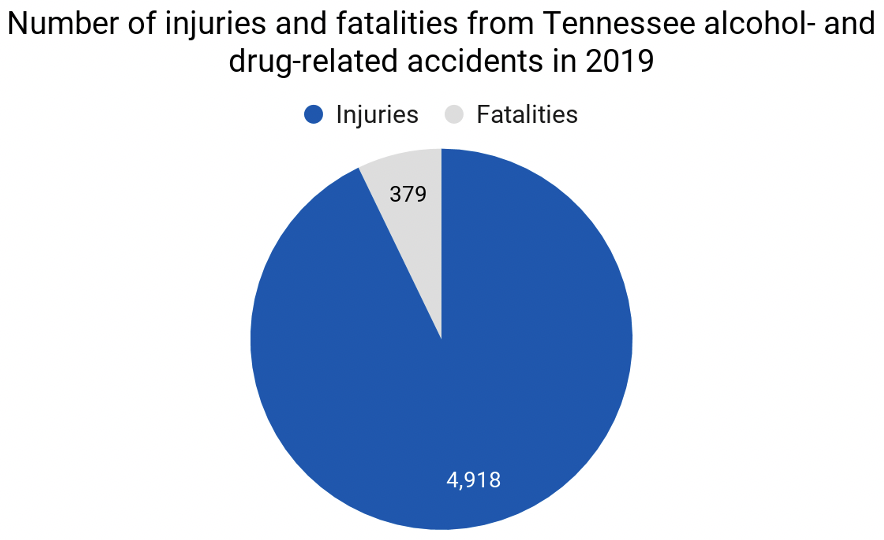
Getting home safely should always be the most important part of the night
“DUI” means “driving under the influence,” which is driving drunk or while using drugs that might impair your ability to drive safely.
Any car accident has the potential to be serious or fatal, both for the driver, their passengers, and any other road user.
A DUI crash is no different.
Under Tennessee insurance law, the injured person’s expenses should be covered by the at-fault driver’s insurance (i.e. the driver who caused the accident). Therefore, the fact that one of the drivers was drunk will be important if you’re involved in a crash.
One reason why drunk driving accidents are so dangerous is because a drunk driver is unpredictable. Being prepared and understanding the signs of drunk driving can help you steer clear and keep yourself and your passengers safe.

Signs that another driver might be under the influence
- Quick acceleration or deceleration
- Swerving, weaving, or zig-zagging
- Abrupt or illegal turns
- Tailgating
- Driving outside the designated roadway (i.e. on a sidewalk or grass)
- Driving too slowly
- “Near misses” with objects, vehicles or curbs
- Signaling is inconsistent with action
- Delayed response to traffic signals
- Straddling center lane marker
- Driving without headlights in the dark
- Erratic braking or stopping for no reason
What to do if you spot a drunk driver
- Stay away! Your best defensive move is to keep as much distance as possible between your vehicle and theirs.
- Don’t try to pass or flag them down. Don’t draw attention to yourself. A drunk person might not be able to handle even a small distraction. Trying to get them to pull over, or trying to pass, might increase the risk of a crash.
- Get information. If you’re able to get the license plate number, vehicle make and model, or any other distinguishing information about the car or driver, take note if you can do so safely.
- Call 911. A drunk driver (or any driver who’s driving erratically, recklessly, or otherwise unsafely) is an emergency situation. Call 911 and report where you see the vehicle, what direction the vehicle is heading, and any other information that might assist in apprehending the driver.
What’s “too drunk to drive?”
If you’ve been drinking, don’t drive.
The legal limit for alcohol consumption is a blood alcohol concentration (BAC) of 0.08%. However, there’s no “formula” or method to know your exact BAC because it’s affected by several factors. The only ways to accurately test BAC are using a breath test (commonly called a “Breathalyzer,” which is usually used by law enforcement), or a urine or blood test.
Your BAC can be affected by:
- How much alcohol you drank
- How quickly you drank
- Your body weight
- Altitude
- The amount you’ve eaten, amount of time since you ate, and what you ate
- Your biological gender
- Type of alcohol
- Other medications and medical conditions
- Alcohol tolerance
- Fatigue, stress, and mood
You can’t determine your BAC based on a chart or calculator. You also can’t judge your own BAC based on your friend’s BAC, or even your own BAC on a different day or at a different time. Many of the factors that affect BAC are variable (food, level of stress, medications, etc.), so the only way to guarantee that you’re within the legal BAC limit is not to drink any alcohol before you drive.
There are standard drink sizes in the U.S., and you might be able to somewhat predict your BAC based on the number of drinks consumed. The CDC says 14 grams of pure alcohol is the approximate amount a 160-pound man would need to drink in an hour in order to reach the BACs listed below.
A standard drink is:
- 12 ounces of beer (5% alcohol)
- 8 ounces of malt liquor (7% alcohol)
- 5 ounces of wine (12% alcohol)
- 1.5 ounces (1 shot) of 80-proof distilled spirits or liquor (40% alcohol)
Tennessee DUI penalties
| 1st offense |
|---|
| Jail time: Between 48 hours and 11 months, 29 days 7 consecutive days minimum for BAC higher than .20 |
| License revocation: 1 year, restricted license available |
| Mandatory treatment program |
| Restitution paid to any person who was injured or suffered a property loss |
| Fine: $350-$1,500 |
| Additional fees: Towing, bail, attorney fees, high-risk insurance, court costs, and reinstatement fees could be up to $5,000 |
| Ignition Interlock Device (IID): Minimum first-year costs could be more than $1,000 If 2 DUI convictions in 5 years, an ignition interlock device (IID) is required for 6 months at your expense |
| 2nd offense |
| Jail time: 45 days to 11 months, 29 days |
| Fine: $600-$3,500 |
| License revocation: 2 years, restricted license available |
| IID Installed at your expense If 2 DUI convictions in 5 years, IID is required for 6 months at your expense |
| Restitution Paid to any person who suffered personal injury or loss |
| 3rd offense |
| Jail time: 120 days to 11 months, 29 days |
| Fine: $1,000-$10,000 |
| License revocation: 6 years, restricted license available |
| Vehicle seizure |
| Alcohol and drug treatment program |
| IID Installed at your expense If 2 DUI convictions in 5 years, IID is required for 6 months at your expense |
| 4th or subsequent offense |
| Class E Felony |
| Jail time: Up to 1 year, minimum 150 consecutive days served |
| Fine: $3,000-$15,000 |
| License revocation 8 years, restricted license available |
| Vehicle seizure |
| Alcohol and drug treatment program |
| IID Installed at your expense If 2 DUI convictions in 5 years, IID is required for 6 months at your expense |
| Vehicular assault: Serious injury to another person by an intoxicated driver |
| Class D Felony |
| Jail time: 2-12 years |
| License revocation 1-5 years, no restricted license |
| Fines and court costs |
| DUI with passenger under 18 years old (child endangerment) |
| Class D Felony if a child suffers serious injury Class B Felony if a child dies |
| Jail time: 2-12 years for a class D felony 8-30 years for class B felony |
| License revocation |
| Vehicular homicide (fatal crash caused by DUI with .08 BAC or higher) |
| Class B Felony |
| License revocation: 3-10 years, no restricted license |
| Aggravated vehicular assault with DUI (any combination of 2 or more prior DUI convictions and vehicular assault convictions) |
| Class A Felony |
| 1 prior vehicular homicide |
| BAC of .20 or higher at the time of vehicular homicide with one prior DUI or vehicular assault offense |
| Underage possession of alcohol |
| License suspension: 1 year or until age 17 (whichever is longer) for 1st offense 2 years or until age 18 (whichever is longer) for 2nd offense Restricted license on 1st offense at court’s discretion, but must serve 1 year of license suspension before restricted license on 2nd offense |
| Driving while impaired (minor) |
| License revocation: 1 year, no restricted license Fine: $250 Community service Could be ordered by the court |
(Hint: total expenses can be more than $12,000!).
Personal injury lawsuits from a drunk driving accident
If you were injured in a drunk driving accident, you need to know a few things:
1. YOU cannot charge a person with a crime.
A crime or traffic-related offense is handled by law enforcement. You might be called as a witness at trial, but only the government (law enforcement) can pursue a DUI charge related to an accident.
2. If you file a personal injury lawsuit, your only recovery is money.
Your lawsuit won’t result in a person’s being charged with a crime, serving jail time, community service, or any other penalty. It’s a civil matter that can be resolved by the court system and can result in your receiving a damage award (financial) for the amount of your expenses related to the accident.
You might feel like you deserve justice—and rightfully so—but the way the court system is set up, the criminal courts are separate from civil courts, which means your recourse as a private citizen is financial damages.
3. A car insurance policy usually doesn’t cover DUI-related accidents.
Tennessee is an at-fault state. That means that an injured driver makes a claim against the insurance company for the driver who was liable (at fault) for the accident. However, most car insurance policies don’t cover an accident caused by intentional conduct.
Some insurers have the policy that you chose to drink and chose to drive, which means a DUI accident is intentional since the driver should’ve known that drinking and driving is dangerous and is likely to harm another person.
But that doesn’t mean that a victim is left high and dry. If you have an uninsured motorist policy, you can use that to pursue your claim. If it’s not enough, you’ll have to file a lawsuit in order to recover costs.
How much can you receive in damages from a DUI accident?
Like any personal injury lawsuit, that depends on 3 factors:
- The amount of your economic loss. Economic loss is how much the accident cost. Your costs could include medical treatment, property loss, lost wages or future earning capacity, or other financial losses.
- Severity and permanence of damages. If it was an accident that left you with serious injuries, you might be experiencing emotional distress, pain and suffering, loss of consortium, or other conditions that aren’t easily quantified in dollars and cents. The more severe your physical injuries, the more you’ll be able to recover in non-economic damages.
- Degree of fault. Tennessee is a comparative fault state. Each driver is assigned a percentage of liability in an accident. A driver who is more than 50% at fault for an accident cannot recover any damages in a lawsuit. Even if the other driver was drunk and at fault, if the court finds that you were liable in any way, your damage award can be reduced by the percentage for which you were at fault for the accident.
Tennessee Dram Shop Law
Under specific conditions, a person injured in a DUI accident might be able to make a personal injury claim against the vendor who sold alcohol to the driver who caused the accident. A claim under the state’s Dram Shop Law can be pursued in Tennessee if:
- The vendor sold the alcohol to the intoxicated driver (in other words, not provided alcohol at a party, but actually sold it from a business),
- The alcohol was sold to a person who was a minor (under age 21) or who was visibly intoxicated, and
- The sale of the beverage directly caused the injury.
There is no civil social host law in Tennessee as there are in other states. A host who serves alcohol is not liable for drunk driving injuries caused by an impaired driver who was served at their home. However, the host might be criminally responsible if they provided alcohol to minors, but the injured person cannot file a civil lawsuit against the host on that basis.
What to look for after a DUI accident
If you’re involved in an accident and you suspect the driver is drunk, don’t confront the person on your own. Call the police—that’s their job and they’re trained to handle the situation.
However, if you have reason to believe that the person is drunk, you can look for these signs and inform the responding police officer:
- Smell of alcohol or marijuana on the other driver. The other driver might use a breath spray, gum, mints, or another substance to try to cover the smell before the police arrive.
- Use of eye drops. If the driver is under the influence of marijuana or other drugs that might not appear on a routine alcohol BAC test, they might use eye drops to make their appearance look more “normal” to police. If you see a driver administering eye drops, let the police know so that they can consider whether to give a drug test.
- Disposing of alcohol containers or drug paraphernalia. If you observe the driver tossing anything from the car, inform the police.
- Driver switching seats after the crash. Some drunk drivers will switch seats with a sober passenger so they can claim that the passenger was actually the driver. If you see this happen, inform the police at the scene.
Some of these clues might happen before police arrive on the scene, so they won’t know unless you tell them. The police officer will then determine whether further action is needed.
Finally, call a lawyer. Since insurance isn’t as straightforward with a DUI, you don’t want to miss the opportunity to file a claim or file for an amount of money that’s less than you deserve.
The Enjuris law firm directory includes Tennessee car accident lawyers who are experienced and skilled at handling cases for victims of DUI accidents. They can help you recover the damages you need to cover your short- or long-term expenses.
Tennessee champions Bentley's Law
This vital piece of legislation ensures those who drive under the influence face financial accountability for the minor children of parents they've grievously harmed.
See our guide Choosing a personal injury attorney.

